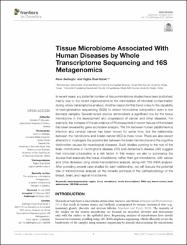| dc.contributor.author | Salihoğlu, Rana | |
| dc.contributor.author | Önal Süzek, Tuğba | |
| dc.date.accessioned | 2021-04-16T07:31:55Z | |
| dc.date.available | 2021-04-16T07:31:55Z | |
| dc.date.issued | 2021 | en_US |
| dc.identifier.citation | Salihoğlu R and Önal-Süzek T (2021) Tissue Microbiome Associated With Human Diseases by Whole Transcriptome Sequencing and 16S Metagenomics. Front. Genet. 12:585556.
doi: 10.3389/fgene.2021.585556 | en_US |
| dc.identifier.uri | https://doi.org/10.3389/fgene.2021.585556 | |
| dc.identifier.uri | https://hdl.handle.net/20.500.12809/9173 | |
| dc.description.abstract | In recent years, a substantial number of tissue microbiome studies have been published, mainly due to the recent improvements in the minimization of microbial contamination during whole transcriptome analysis. Another reason for this trend is due to the capability of next-generation sequencing (NGS) to detect microbiome composition even in low biomass samples. Several recent studies demonstrate a significant role for the tissue microbiome in the development and progression of cancer and other diseases. For example, the increase of the abundance of Proteobacteria in tumor tissues of the breast has been revealed by gene expression analysis. The link between human papillomavirus infection and cervical cancer has been known for some time, but the relationship between the microbiome and breast cancer (BC) is more novel. There are also recent attempts to investigate the possible link between the brain microbiome and the cognitive dysfunction caused by neurological diseases. Such studies pointing to the role of the brain microbiome in Huntington's disease (HD) and Alzheimer's disease (AD) suggest that microbial colonization is a risk factor. In this review, we aim to summarize the studies that associate the tissue microbiome, rather than gut microbiome, with cancer and other diseases using whole-transcriptome analysis, along with 16S rRNA analysis. After providing several case studies for each relationship, we will discuss the potential role of transcriptome analysis on the broader portrayal of the pathophysiology of the breast, brain, and vaginal microbiome. | en_US |
| dc.description.sponsorship | YOK 100/2000 program | en_US |
| dc.description.sponsorship | United States Department of Health & Human Services National Institutes of Health (NIH) - USA | |
| dc.item-language.iso | eng | en_US |
| dc.publisher | FRONTIERS MEDIA | en_US |
| dc.relation.isversionof | 10.3389/fgene.2021.585556 | en_US |
| dc.item-rights | info:eu-repo/semantics/openAccess | en_US |
| dc.subject | Neurodegenerative | en_US |
| dc.subject | Vagina | en_US |
| dc.subject | Tissue microbiome | en_US |
| dc.subject | Whole transcriptome | en_US |
| dc.subject | RNA-seq | en_US |
| dc.subject | Breast cancer | en_US |
| dc.subject | 16S RNA analysis | en_US |
| dc.subject | Brain microbiome | en_US |
| dc.title | Tissue Microbiome Associated With Human Diseases by Whole Transcriptome Sequencing and 16S Metagenomics | en_US |
| dc.item-type | article | en_US |
| dc.contributor.department | MÜ, Fen Bilimleri Enstitüsü, Biyoinformatik Ana Bilim Dalı | en_US |
| dc.contributor.authorID | 0000-0003-3277-2446 | en_US |
| dc.contributor.institutionauthor | Salihoğlu, Rana | |
| dc.contributor.institutionauthor | Önal Süzek, Tuğba | |
| dc.identifier.volume | 12 | en_US |
| dc.relation.journal | FRONTIERS IN GENETICS | en_US |
| dc.relation.publicationcategory | Makale - Uluslararası Hakemli Dergi - İdari Personel ve Öğrenci | en_US |


















